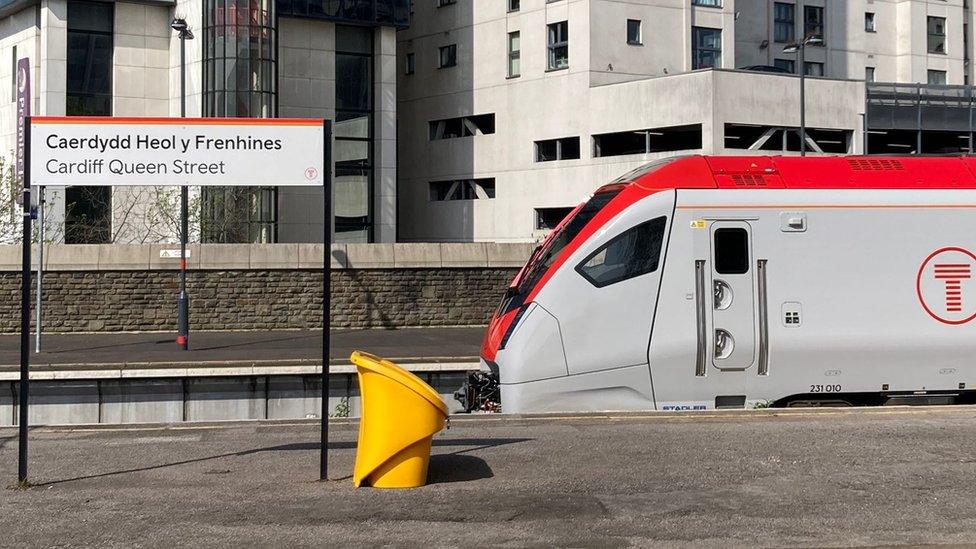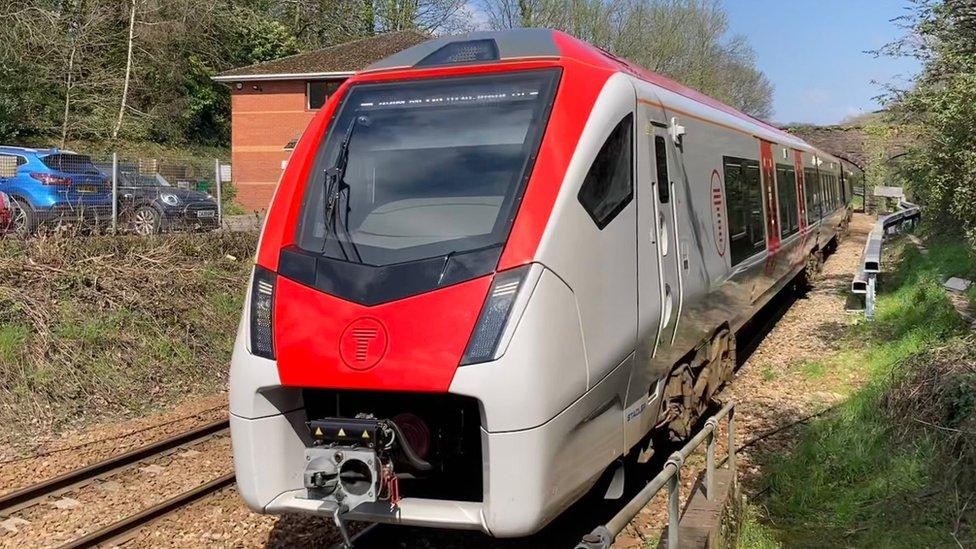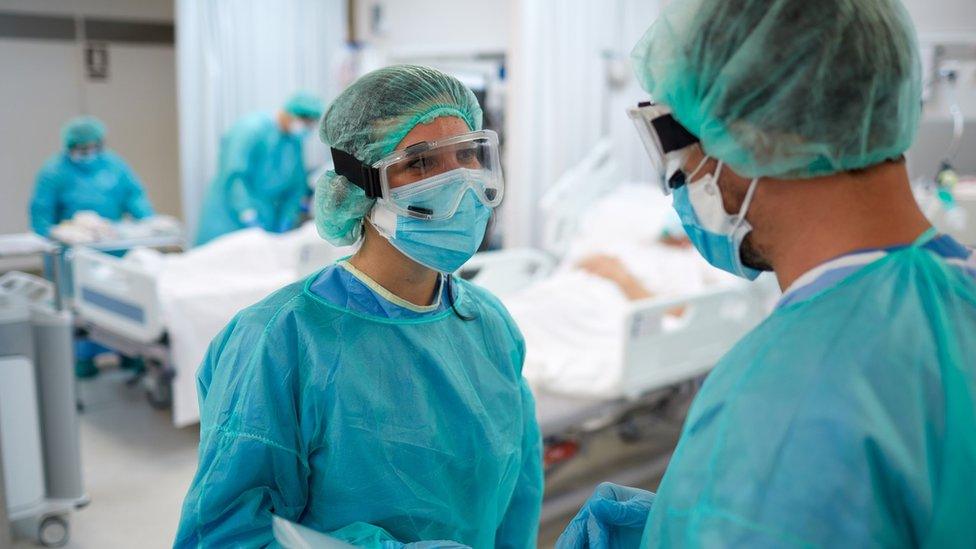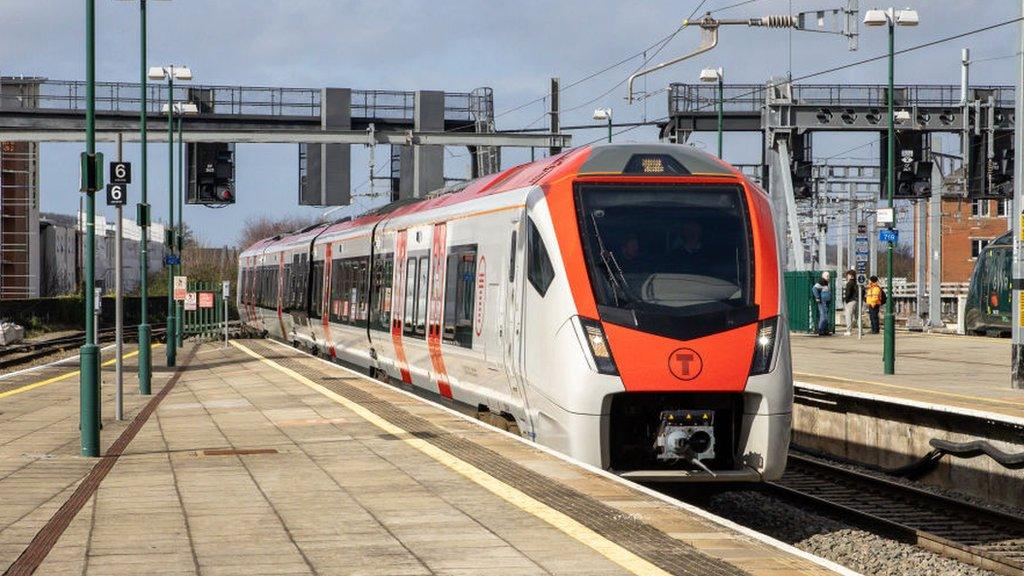Transport for Wales: More cash for rail firm after lost ticket sales
- Published

Transport for Wales is owned by the Welsh government
Taxpayer funding for rail operator Transport for Wales (TfW) is increasing by around half because it has sold fewer tickets than hoped.
Home working means fewer passenger are commuting to work on the trains, leaving a hole in TfW's budget.
On Tuesday, the Welsh government announced £125m more for TfW this year, a "massive" rise, according to one finance expert.
Finance Minister Rebecca Evans has said she expects "pressure on rail" budgets to "continue for some time".
The Welsh Conservatives said they were "surprised" and "shocked" by the cash injection.
Tuesday's announcement came as part of wide-ranging budget changes designed to prop-up the company and ease mounting pressure on the NHS.
Cuts in other departments, funding from financial reserves and extra cash from Westminster has freed up more than £600m.
Around £425m is going into the NHS, but ministers warn the service will still face difficult decisions as it struggles with financial deficits and long waiting lists.
Core NHS funding was already worth more than £9bn.
The funding for rail comes on top of £205m that Labour's Welsh government was intending to give TfW this year.
The company is making less money than expected from ticket sales because fewer commuters than expected have returned after the pandemic.
Although there have been more leisure trips, the government said passenger revenue was "significantly below" what was expected when the network changed hands five years ago.
When KeolisAmey took over from Arriva Trains Wales in 2018, it forecast that passengers would make 57.5m trips this year. The revised forecast is now just 27.4m.
The railway was nationalised and its day-to-day running handed to TfW in February 2021.
David Phillips, from the Institute for Fiscal Studies think tank, described the train funding increase of more than 50% as "massive".
"While not much more than a quarter of the extra funding being provided to the NHS, the extra funding being provided for Transport for Wales is much bigger relative to its pre-existing budget - over 50% compared to the cash budget set out in this June's supplementary budget," he said.
"That's massive.
"The Welsh government highlights lower passenger numbers and higher costs as the reason why this extra funding is needed.
"But it doesn't say what costs have increased since the Welsh budget, and if anything I expect fuel and energy costs may be lower than expected then, for example.
"This suggests either that it is income from passengers that is coming in much lower than expected, or that there's been large, sudden and unexpected increases in other costs."
Ms Evans, who announced Tuesday's budget changes, called the decline in rail passengers "disappointing".
Welsh Conservatives shadow transport minister Natasha Asghar said the extra TfW money should have been spent on health, education and roads instead.
She said she has written to Climate Change Minister Julie James, whose responsibilities include transport, for clarity on how the £125m will be spent.
"Quite frankly I was surprised, I was slightly shocked and £125m for transport did set my alarm bells ringing that is the honest truth," she said.
"I would rather that £125m was spent on our failing health services," she said.
Ms Asghar said she would also prefer the money to be spent on education and improving roads.
Asked by BBC Wales to explain how the £125m would be spent by TfW, a Welsh government spokesperson said: "The pandemic has transformed travel patterns - while the leisure market has rebounded strongly, more people now work from home and fewer people travel for business meetings.
"The additional funding announced for Transport for Wales will help to safeguard services that are valued by passengers and the communities they serve."
'Bit of a money pit?'
The Welsh government also has a target to encourage 30% of people to work remotely.
Asked if it was time to re-think that, Ms Evans said: "I think that it's important that people do work from home if they can, if it's right for them.
"Equally, it will be right for other people to go into the office."
As part of the South Wales Metro, TfW is delivering a major upgrade of the network in Cardiff and the South Wales Valleys.
In March it emerged that the cost of the scheme, due to be completed in 2025, had rocketed more than £260m to £1bn.
In the Senedd, Plaid Cymru finance spokesman Peredur Owen Griffiths asked whether the extra spending was "an admission that the service is not performing as it should be and becoming a bit of a money pit?"
Government documents say: "While it [TfW] will still face substantial pressures, this additional funding will support the organisation as it continues to manage increased costs and a reduction in passenger numbers post-pandemic."


Significant changes to the Welsh government's budget show it is still counting the cost of Covid.
Lockdown left a legacy of soaring waiting times, high inflation and a new culture of working from home.
All these things have infected Labour's spending plans.
Money was needed to keep the NHS's head above water, fund higher public sector pay and increase the rail subsidy.
You can blame events beyond Mark Drakeford's control. He can't stop people getting sick or make them catch the train.
But he can - and should - plan in advance, and the question from the opposition is whether more foresight may have avoided the governmental whip-round announced by Rebecca Evans on Tuesday.
- Published17 October 2023

- Published14 October 2023

- Published9 August 2023

- Published25 July 2023
